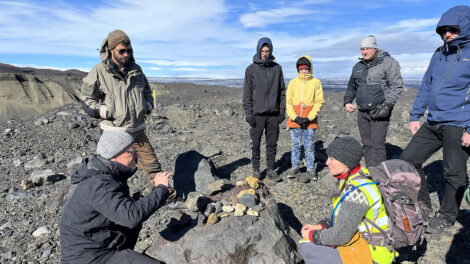Prof. Sue Wenze receives Fulbright to advance her research in mental health care for mothers of multiples
By Bryan Hay

Sue Wenze, associate professor of psychology
Sue Wenze, associate professor of psychology, has received a Fulbright Scholar Award to help advance her research aimed at supporting mental health care for new mothers of multiples.
Backed by the Fulbright, Wenze will join colleagues at University of Coimbra in Coimbra, Portugal, in spring to test a mobile mental health support intervention targeting the early postpartum months.
Wenze, who has been studying this topic since 2012, two years after she became the mom of identical twin daughters, says her collaborative work in Portugal represents the next step in a line of research.
“It combines two areas of research that I work on,” she says. “And that’s perinatal mental health and mobile mental health, interventions that are either delivered entirely by technology or are designed to support and extend an in-person therapeutic relationship through the use of technology. And this is kind of a fusing of the two. In particular, we’re looking to test an already established, already tested perinatal mental health intervention in a new sample. And in this case, it’s new mothers of multiples, so twins, triplets, and beyond.”
Simultaneous care for two or more newborns can present immense challenges for new parents, leading to stress, sleep deprivation, a feeling of isolation, and an overall disruption of life. Wenze’s previous research has indicated that online and telehealth support appeals to these parents, who may have difficulty getting to face-to-face therapy sessions.
Mobile technology to deliver mental health interventions has expanded and received support over the last 10-15 years, says Wenze, a licensed clinical psychologist who carries a small caseload of clients at a group practice in Bethlehem, Pa.
“Most meta-analyses have suggested that technology-assisted and automated interventions can work just as well as traditional face-to-face therapy,” she notes. “So psychoanalytic therapy, which really relies on talking, doing free association and interpretation, using the therapeutic relationship itself as a tool in treatment, can’t really be done without a live therapist involved. But cognitive behavioral therapy and mindfulness-based therapy, and acceptance and commitment-based approaches are really very structured and very well suited to being automated in very creative ways.
“You can learn to identify maladaptive thoughts that you’re having, and appropriately challenge patients to learn about deep breathing exercises and practice new coping skills remotely,” Wenze says. “Mobile intervention is a really good way to augment, enhance, and extend care, and clients can do it at times that work for them.”
People in need of perinatal mental health care stand to benefit from mobile support, she says, adding, “You’re stressed, you’re busy, you’re sleep deprived, you’re juggling extra balls. Sometimes there’s no time to get out of the house to see a therapist. But if you can access something in your own home 24 hours a day, seven days a week, that can help you cope.”
Wenze’s own research will complement the research at University of Coimbra, which has faculty devoted to conducting extensive perinatal mental health work and mobile interventions.
“The intervention we’re going to test actually has already been designed and tested in a Portuguese sample of new moms who have given birth to singletons in the past three months,” she says. “In this study, we’re also focusing on the first three months postpartum, because that’s typically what parents of multiples identify as the most challenging time.”
Wenze and her colleagues will gather data on acceptability, how many modules participants complete, how long they stay on the modules, and the dropout rate, and conduct exit interviews to see if participants perceive the mobile program to meet their needs. They also will conduct exploratory analyses to determine if the program might help relieve symptoms of depression, stress, and anxiety. If so, they will conduct a larger-scale test in the future to formally examine those hypotheses.
“We will want to know if the topics were relevant to moms of multiples,” she says. “We’ll certainly have a conference presentation or two and a publication result from this work, which will set the stage for a long-term collaboration. That’s what the Fulbright mechanism wants us to establish.”
At Lafayette, Wenze, who’s on sabbatical this academic year, teaches courses related to psychopathology and applied/clinical psychology. She expects her Fulbright experience to provide opportunities to inspire and uplift her own students.
“Students will be able to read whatever we publish, and I can talk to them about the process of psychosocial treatment development, help them brainstorm about the hurdles and problems we faced along the way, and discuss treatment choices,” she says.
“For students doing independent studies, advanced research, EXCEL Scholar work, or volunteer research in my lab, I certainly see opportunities for them to assist with data cleaning, data analysis, and, potentially, help with literature reviews or writing,” she adds. “Whatever is going to come next, I would invite students to be involved in that process.”

